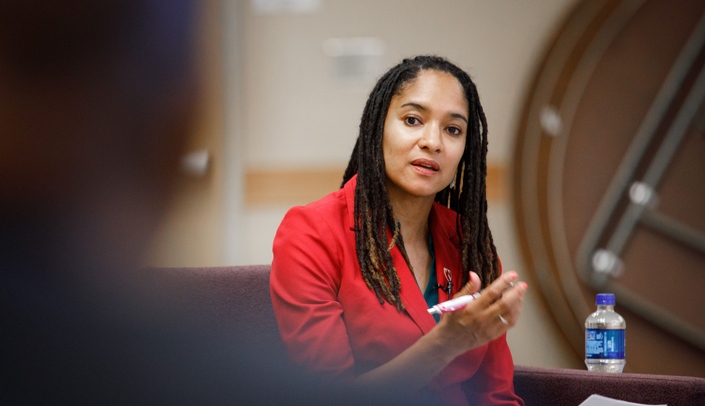The office of inclusion’s latest "Conversations for Inclusive Excellence" forum touched upon the iTEACH core value of courage.
Are people empowered to have the courage to be their true selves at work?
Many people, whether consciously or unconsciously, "code-switch" in professional settings. Sheritta Strong, MD, assistant vice chancellor of inclusion, realized this herself when, as she once read her son's academic essay aloud, he said, "Mom, just use your regular voice."
But it becomes unhealthy when people "cover" who they truly are. And most employees of color or who are LGBTQ+ "feel the need to cover," Dr. Strong said.
Attendees watched a TED talk by Dalia Mogahed, an American Muslim, on what happened after the 9/11 attacks. She was, of course, outraged that someone had attacked our country. But, in the aftermath, "(People) talk about my community kind of like we are a tumor in the body of America. And the only question is, are we malignant or benign?"
Even benign tumors are kept "under surveillance," she noted.
Should she and her family "cover"? It was a difficult decision, but they decided to attend mosque the week of 9/11 and found that half the congregation that night was non-Muslim, appearing in a show of support.
That was a happy story. She also gave examples that showed "the toxic air of fear is harming us all," and "bigotry is not just immoral, it can be lethal."
One attendee noticed that Mogahed softened the serious discussion with jokes. "Should we have to do that?"
Dr. Strong said humor is a "mature" mechanism. So, if it helps to give you courage or if you think it might help an audience better understand, it is perfectly OK to use humor to broach serious issues.
But if you think something is not funny, you do not have to do that.
Attendees gave examples of times they felt they had to "cover" and also said that work is much better when people don't feel the need to do that in a situation.
"Just be you," one person said, "because it’s hard to be someone else."
Dr. Strong said "covering" harms that individual but also has a negative impact on the organization.
"Even well-intentioned workplaces have a lot of work to do," she said. "We need to highlight the issues that are holding back inclusive change."

We are considering being more flexible with the time going forward and possible moving to a time near lunch as well as transitioning to in-person events. Thanks to everyone who have been engaged in these activities and your own learning in this space.